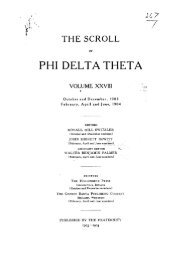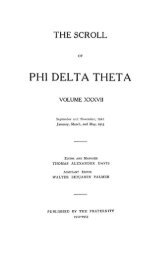1998 Volume 121 No 1–4 - Phi Delta Theta Scroll Archive
1998 Volume 121 No 1–4 - Phi Delta Theta Scroll Archive
1998 Volume 121 No 1–4 - Phi Delta Theta Scroll Archive
You also want an ePaper? Increase the reach of your titles
YUMPU automatically turns print PDFs into web optimized ePapers that Google loves.
gion, ballet, theater, travel, movies and books. He loved active<br />
people and feared dullness. In the late '20s, just as<br />
Hemingway and the other expatriates were starting to come<br />
home, Bromfieid moved his family to France where he followed<br />
his pattern. He had a farm at Senlis and an apartment<br />
in Paris. He skied in Switzerland, golfed, swam, painted, drove<br />
sports cars, attended bullfights and wrote novels with his<br />
usual passion. The farm at Senlis became the model for<br />
Malabar Farm. Anybody who was anybody found his way to<br />
Senlis where, in between farming, writing and having one<br />
very good time, Bromfieid would entertain.<br />
Two of his guests, the Majarani of Cooch Behar and the<br />
Majaraja of Baroda, interested Bromfieid in India and for a<br />
time, he and his family lived on the Malabar Coast. Later, he<br />
wrote a novel about India, "The Rains Came," which proved<br />
to be his most popular novel. Back in France, Bromfieid<br />
watched the political situation in Europe begin to deteriorate<br />
with the rise of Hitler and other Fascist dictators.<br />
Home again<br />
It was time, Bromfieid decided, to come home. In 1938 the<br />
family settied near Oberlin. But that was temporary. Bromfieid<br />
had his eye on Pleasant Valley. He had a plan. In 1939, he purchased<br />
four farms and combined them into one which he<br />
named Malabar. By this time he had 12 books published. Another<br />
18 would follow during the Malabar Farm years. <strong>No</strong>w<br />
Bromfieid began his new career as a spokesman for restoring<br />
ruined farm lands with such tools as improved grasses and<br />
contour plowing. He wanted to turn Malabar into an American<br />
showcase. And with his sense of showmanship and his<br />
cosmopolitan connections, he did just that. He often clashed<br />
with his first farm manager. Max Drake, a young farmer with a<br />
college education. "He (Bromfieid) became a great exponent of<br />
contour farming and soil conservation," Drake recalled. "His<br />
most important contribution to farming was winning converts<br />
to soil conservation." Drake recalls "The Sunday Sermons" on<br />
nearby Mount Jeez when Bromfieid, standing on a farm<br />
wagon, would deliver impassioned talks about farming.<br />
"He had plenty of followers," Drake said.<br />
Drake and Bromfieid collided over livestock, Bromfieid<br />
wanting hogs and Drake not wanting them. Drake won that<br />
round. But not all of them. Bromfieid believed a farm should<br />
be nearly self-sufficient for the needs of those who lived on it.<br />
Drake wouldn't go that far. But the two forged a partnership<br />
and, after four years, the farm began to break even, Drake said.<br />
His boss loved working in the fields and had a special feeling<br />
for gardening. And, of course, a special flair for entertaining<br />
visitors. And from his library, the books kept coming, mixed<br />
in with trips to Hollywood to work on scripts. Life on and off<br />
the farm was a continual and energetic round of excitement<br />
for Bromfieid and his family.<br />
Mansfield News Journal editor D. K. Woodman recalled<br />
Bromfield's Big House.<br />
"Malabar was a beautiful and gracious house full of fine<br />
furniture and rugs and books and art objects and usually<br />
throbbing with classical music from concealed loudspeakers<br />
that had to vie with animated conversation at all hours.<br />
"Actors, writers, musicians, statesmen, the rich and the plain<br />
folks from nearby were made welcome. Malabar might indeed<br />
have been the chateau of a famed and literate French nobleman<br />
transported across the ocean and a century and a half to the<br />
hills of southern Richland County. Yet it was a place teemingly<br />
alive to the issues of the day."<br />
That's how the romance of Bromfield's Malabar affected<br />
those who came and enjoyed. And who sometimes put on overalls<br />
to help in the fields. Bromfield's enthusiasm seemed to<br />
catch very easily. Chet McGrew, the Richland County agriculture<br />
agent in that era, recalls Bromfieid. "<strong>No</strong>body ever took the<br />
area by storm like Louie," he said. "He couldn't sit still for long.<br />
He always had visitors and work to do. His life was geared to<br />
constant movement. Chance is terribly slow and he didn't want<br />
it that way.<br />
And so Bromfieid wrote books, short stories and magazine<br />
articles, explaining his faith in farming and his social beliefs.<br />
He kept this up until his final illness in 1955. His last book,<br />
"Animals and Other People," was published<br />
that year. James Hughes, a professor<br />
of English at Wright State University in<br />
Dayton, wrote about Bromfieid in 1979<br />
and had this to say:<br />
"Bromfield's apparently wholesome<br />
outlook on life and his persistence in<br />
communicating that outiook have run<br />
counter to certain literary tastes. In a period<br />
in which literary critics reserve their<br />
highest praise for profoundly anxious and<br />
obscure writing, Bromfieid does not fare<br />
well. Some critics have been irritated at<br />
Bromfield's ability to write with ease, just<br />
as they have been irritated at Bromfield's<br />
individuality and its sometimes cranky<br />
manifestations. Bromfieid, moreover, attained<br />
during his lifetime, two things<br />
which some critics cannot forgive: popularity<br />
and wealth."<br />
And, long after his death, one very fine state park.<br />
^slife was<br />
geared to<br />
constant<br />
movement.<br />
Chance is<br />
terribly slow<br />
and he<br />
didn't want<br />
it that way.<br />
http://www.phidelt-ghq.com WINTER <strong>1998</strong> THE SCROLL 15

















